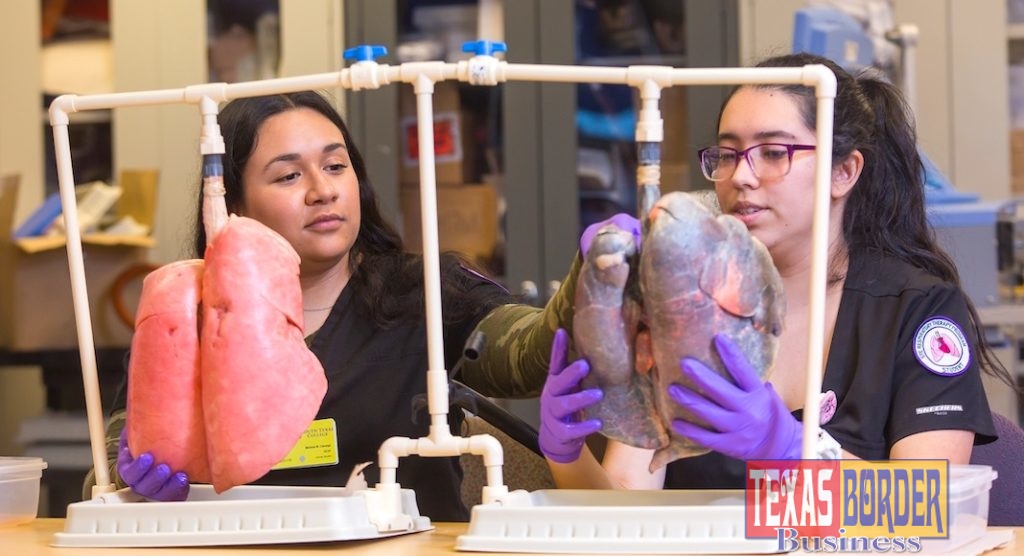
Texas Border Business
McAllen, Texas – Melissa Cienega and Michelle Leon agree that the effects of smoking have affected them in many ways since they were both very young.
Cienega, now a student within STC’s Respiratory Therapy program says she was exposed to tobacco use at nearly every family event she attended growing up. Since both of her grandparents were habitual smokers, she dealt with health issues as a result of second-hand exposure including persistent itchy throat or constant coughing, she said.
But the most significant impact would be the toll that smoking would take on her family’s overall health. Her grandparents would eventually begin struggling with Chronic Obstructive Pulmonary Disease (COPD), a term used to describe progressive lung diseases including emphysema, chronic bronchitis, and non-reversible asthma as a result of years of smoking, she said.
“I grew up with them always smoking around us, but they themselves didn’t know the health risks,” said Cienega, a native of Sullivan City and a graduate from La Joya High School. “By the time they decided to quit though, it was too late for them and they were already quite ill. When I look at my family issues, I realize that it’s really a bad habit, but it was just too late for them.”
Michelle Leon, a graduate from McAllen High School, said her mother was a smoker for years, but she didn’t find out about her mom’s habit until she was already in college.
“I recently found out that my mom was a smoker for 10 years before I was even born,” Leon said. “I didn’t even know until I entered this program and she began telling me her backstory. She said she smoked because all her friends used to do it, but she stopped after I was born.
“Just like my mom, I think many people have a background with smoking that we don’t know about,” Leon said. “These days when I go to clinicals, I see the effects of what smoking really does to you but people don’t usually see that perspective. They don’t see the after-effects of what happens to your lungs.”
Cienega and Leon are now ambassadors for the Truth Initiative for STC, which is among the 48 colleges and universities to be awarded a grant to adopt a 100 percent tobacco or smoke-free campus policy by June 2020.
The effort is part of a national movement among students, faculty, and administrators to address smoking and tobacco use at college campuses throughout the U.S.
Following training with Truth Initiative in Washington D.C. in April, both will be tasked with informing students about the campaign smoke-free initiative at college events including student orientations and all activities at the Nursing and Allied Health campus.
The college will look to engage at least 2,000 students in student-led tobacco prevention, education and tobacco-free campus policy advocacy activities including educating about lung health The goal of the student engagement component is to inspire youth and young adults to use their creativity and social influence to spread the truth about tobacco, thereby driving policy change.
“We are truly excited to make South Texas College a safe, healthy and productive environment,” said STC President Dr. Shirley A. Reed. “The health benefits of reducing secondhand smoke exposure are invaluable and could also help students prepare for the workforce where smoke-free policies are already the norm.”
Ninety-nine percent of all smokers start smoking before the age of 26, making college campuses a critical part in the fight against youth tobacco use. Since 2015, the Truth Initiative Tobacco-Free College Program, in partnership with CVS Health, has awarded more than $1.8 million in funding to 154 colleges and universities to prevent young adults from starting tobacco, help tobacco smokers quit, and reduce everyone’s exposure to secondhand smoke.
“Our goal is to make campus environments healthier places to live, work and learn,” said Robin Koval, CEO,
STC’s efforts are part of a growing trend to clean the air on campuses. Currently, more than 2,342 higher education institutions in the United States have gone smoke- or tobacco-free.
Besides helping to reduce smoking rates, smoke- and tobacco-free policies also change attitudes toward tobacco products and address emerging products such as e-cigarettes.
E-cigarette use has surged over the last year, especially among young people. Nearly seven percent of college students’ ages 19 to 28 reported having used an e-cigarette that contains nicotine in the past 30 days and one study showed that 66 percent of college students are in favor of policies prohibiting e-cigarette use on campus.
The spread of e-cigarettes risks a reversal of the progress made in reducing smoking over the last two decades, given
The latest data shows that 38 million Americans ages 18 and above still smoke, and tobacco use remains the number one cause of preventable death in this country. Research also shows that there are dire health consequences for nonsmokers too. Secondhand smoke exposure causes cancer and cardiovascular disease among other secondhand smoke diseases, which are responsible for more than 41,000 deaths among nonsmoking adults in the U.S.
Of the roughly 20 million college and university students in the U.S., more than 1 million have been projected to die prematurely from cigarette smoking and its effects, according to Truth Initiative.
Over the next 16 months, STC will form a campus task force that will assess tobacco use behaviors and attitudes, identify a treatment plan for current smokers and develop a smoke- or tobacco-free policy.
As the student leaders heading the initiative on campus, Cienega and Leon will also develop and lead educational efforts to build a movement to become a tobacco-free campus. After participation in the program, the institutions are poised to join a growing movement that will protect more than 1.3 million students and 285,000 employees in over 39 states.
“The grant from Truth Initiative has set us up for success, and I’m positive we can achieve our goals,” said Gabriel Peña, Respiratory Therapy Program Chair at South Texas College. “We are going to hit the ground running with our plan so that we can finally take a breath of fresh air on campus.”














